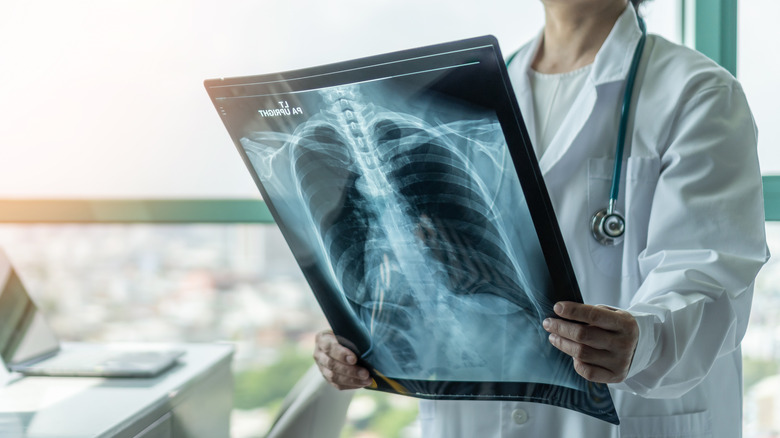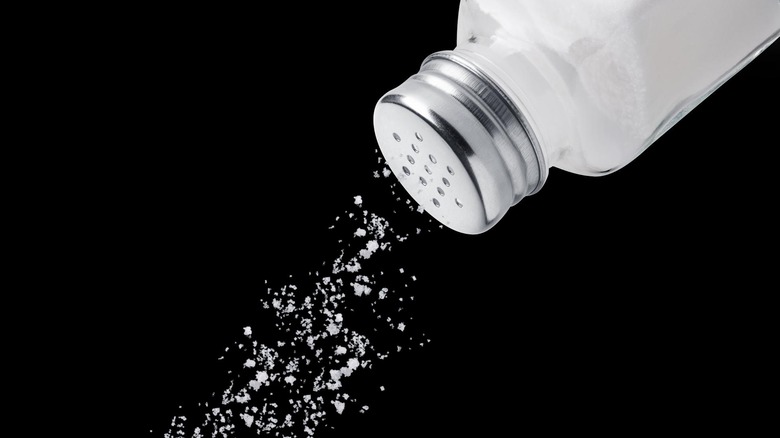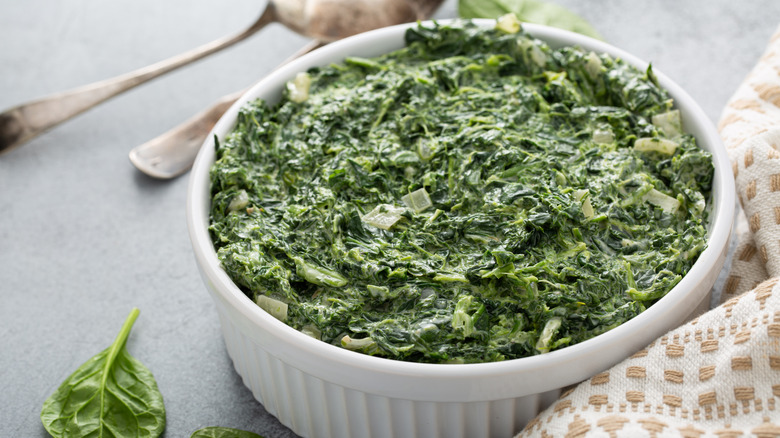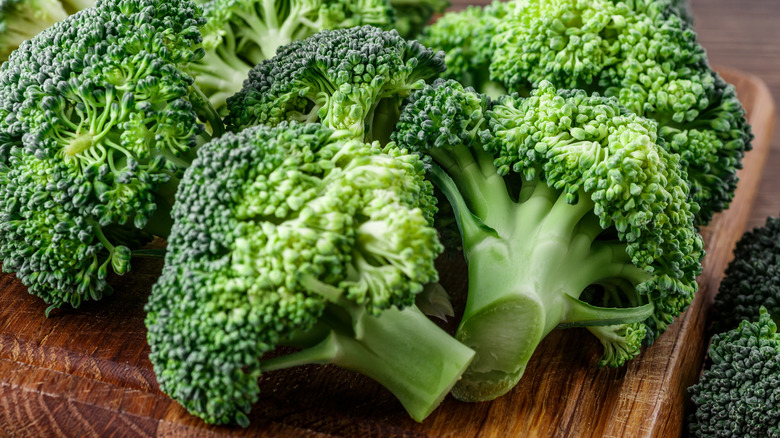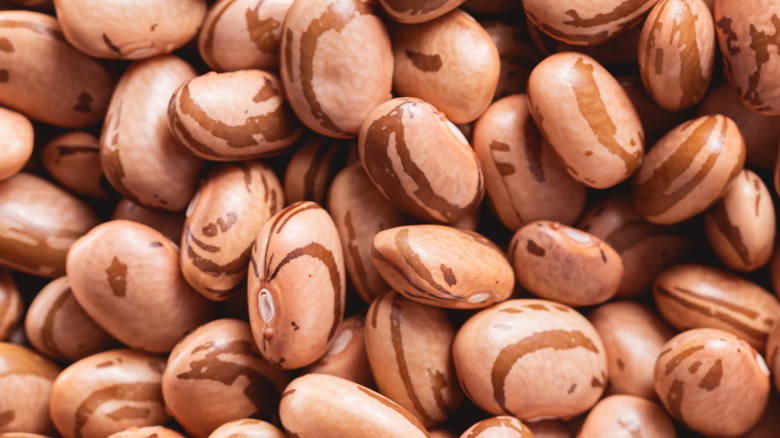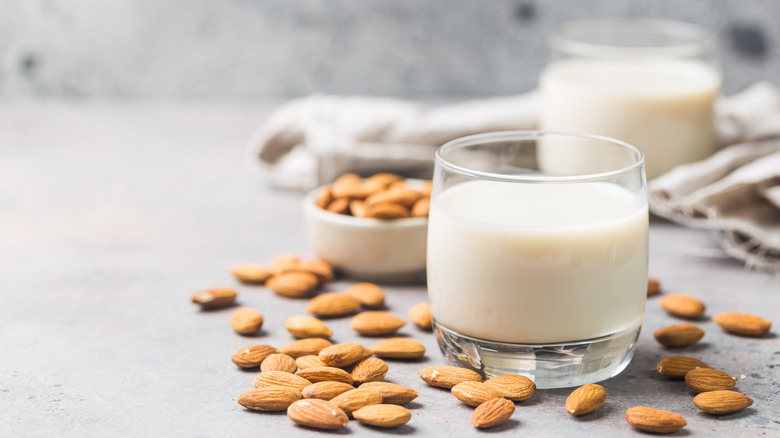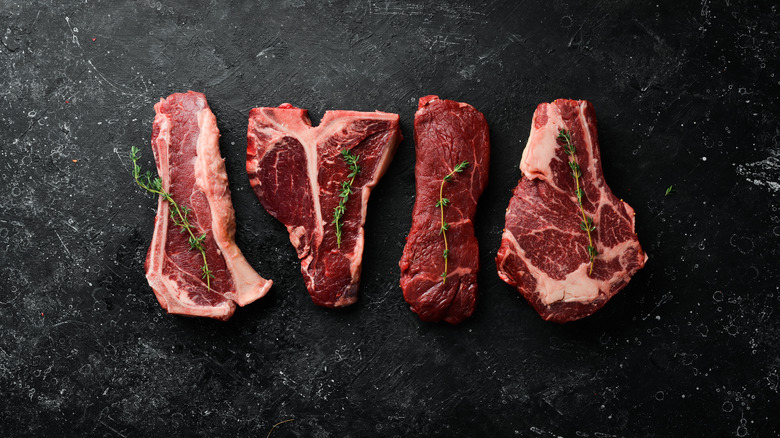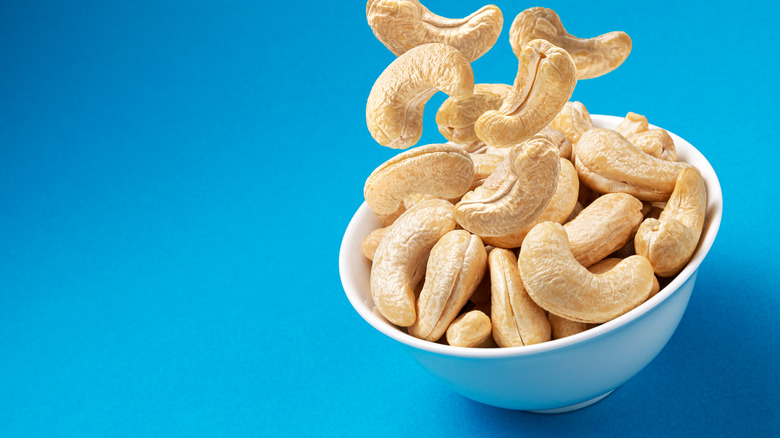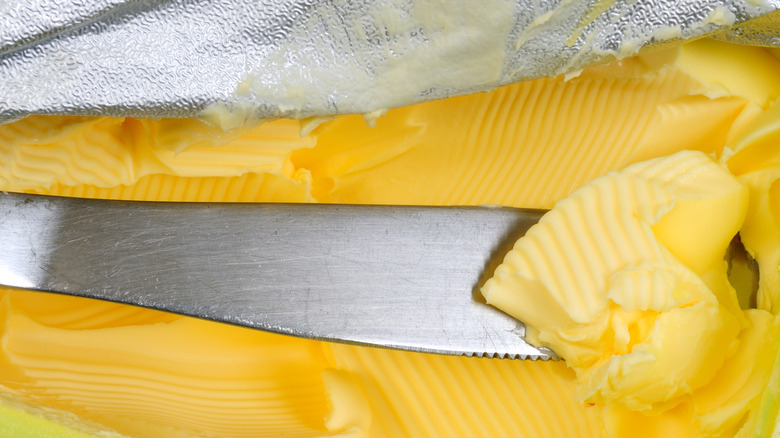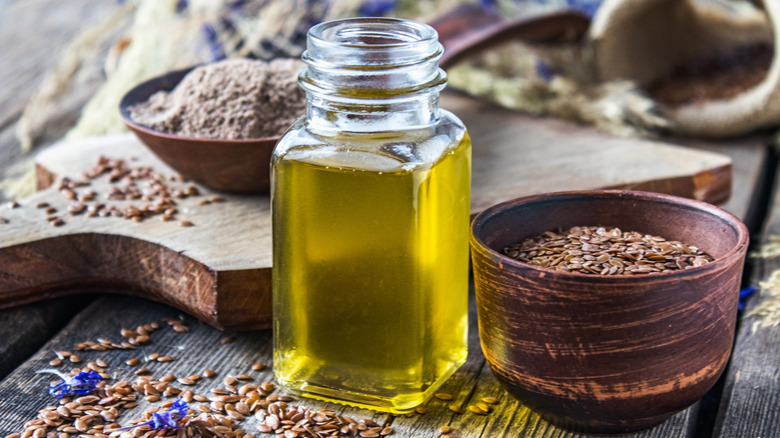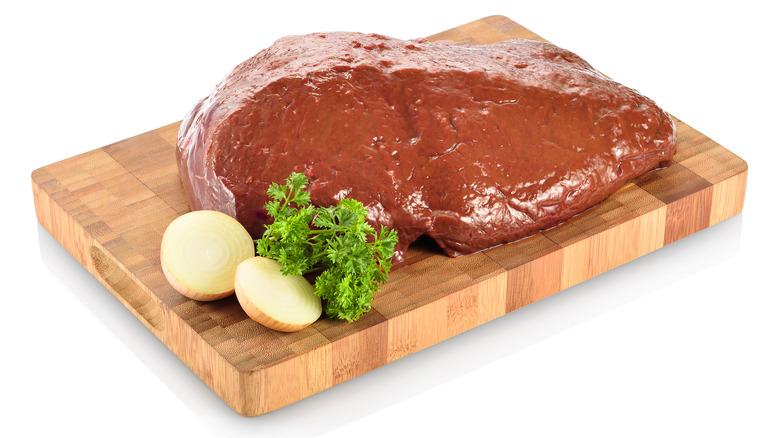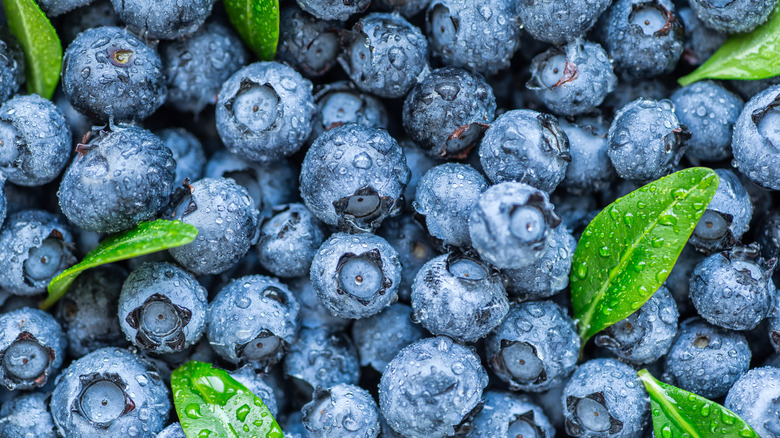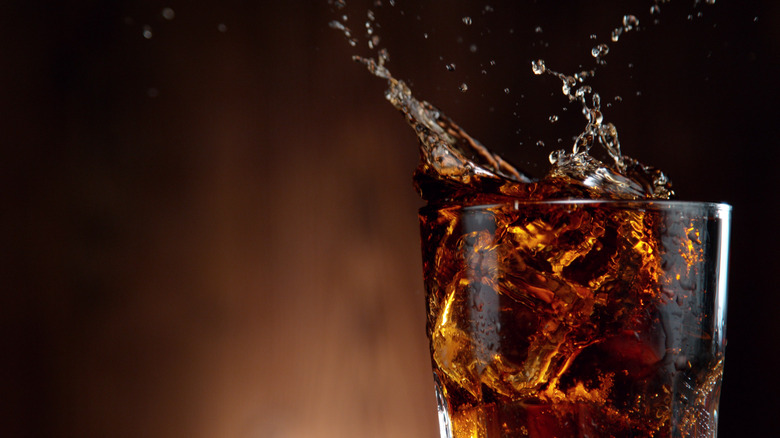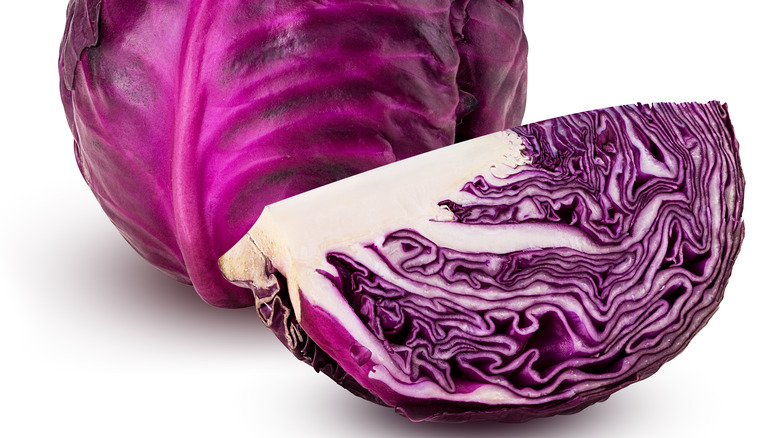7 Foods To Eat And 7 To Avoid For Bone Health
Bones are the unsung heroes of our bodies. Most of us barely give them a thought as we go about our day, but without them, we'd be more like immobile puddles than people. Vital organs like the lungs and heart wouldn't have nearly as much protection without the rib cage. And let's not forget that our brains would be far more susceptible to damage if we didn't have skulls.
Given everything our bones do, it's crucial to keep them healthy and strong. But unlike our skin, we can't see our bones — which means we usually can't tell when they're getting weaker until they sustain damage. Fortunately, as American Bone Health explains, there are three nutrients that are especially important for your bones: calcium, vitamin D, and magnesium. In addition, vitamin A, phosphorus, and potassium are all necessary for strong bones. Other nutrients like zinc and vitamins B12, C, and K could play a role in your bones' good health, although the findings regarding these nutrients are not beyond question.
This brings us to an important point. We are constantly learning about how what we eat and drink affects our bodies, including our bones. In fact, it's not uncommon for studies to contradict one another. But that's not surprising, since the human body is very complex. Thus, it's important to consult a health care professional before you make any significant changes to your diet.
Avoid: anything high in sodium
Let's face it, we humans have a love/hate relationship with sodium. On one hand, our bodies need certain levels of salt to function properly. Plus, a pinch of salt can add flavor to an otherwise bland dish. But going overboard on your sodium intake could have a negative impact on your health, including your bones.
According to Science Daily, researchers from the University of Alberta Faculty of Medicine & Dentistry investigated high sodium's relationship to bone health. Through a combination of experiments involving cells and animal lab models, they found that the same molecule manages sodium and calcium levels. Unfortunately, this means that when the body uses urine to get rid of high amounts of sodium, calcium gets swept up in the same process. This can lead to your bones having less of this important mineral to keep them strong.
Besides high-sodium diets potentially increasing the odds of developing osteoporosis, Science Daily notes that losing calcium through the urine can up your chances of developing kidney stones. So if you think your sodium intake might be too high, the first thing you should do is start keeping a food journal. You also should start checking the Nutrition Facts labels on products. Remember, a food or beverage doesn't have to taste salty to be high in sodium.
Try: cooked spinach
Anyone who's ever seen a Popeye cartoon knows he gets his super strength from eating spinach. However, the famous "sailor man" probably didn't know that how he eats his spinach could make a difference when it comes to his bones' health.
According to Healthline, spinach is packed with calcium, a nutrient that is essential not only for your bones but also your muscles (like your heart). It's also loaded with pigments called carotenoids (which become vitamin A in your body), as well as vitamins C and K1. Spinach also contains magnesium and potassium. And as American Bone Health notes, all of these nutrients are either important for your bones or potential contributors to your bones' overall health. So yes, spinach can definitely be a good addition for a bone-friendly diet — except for one thing.
As Dr. Andrew Weil explains on his website, spinach contains oxalic acid in large enough amounts that it could make it harder for your body to absorb calcium. This means you're technically taking in less of the calcium in the spinach that you would from other calcium sources that don't contain oxalic acid. But not to worry. If you don't want to cut this leafy green from your meals, there is a simple solution: Cooking your spinach can help reduce the negative effects of its oxalic acid.
Avoid: alcohol
Osteoporosis is often associated with older adults, but as the National Institute of Health (NIH) explains, it's actually a cumulative health problem. Yes, thinner bones that are weaker and more prone to fractures tend to occur later in life. However, those bones don't become that way overnight. To compare it to another skeletal issue, eating one piece of candy isn't going to suddenly rot your teeth, but constantly eating candy and not regularly brushing your teeth for years will likely cause dental health problems.
To put it another way, what you do today can affect your bones' health in the future, including your likelihood of developing osteoporosis. And as NIH cautions, consuming alcohol can throw off not only the balance of calcium in your body but also how much calcium your body absorbs. The latter part of this is because alcohol can also affect your vitamin D levels, which are crucial for your bones to take in the calcium they need.
Besides impacting calcium and vitamin D, drinking large amounts of alcohol on a regular basis could throw off one's hormonal levels. Women who often consume high quantities of alcohol could experience a drop in estrogen, which can make them more likely to develop osteoporosis. And while Homer Simpson is known for constantly drinking beer, a real-life version of Homer could have his testosterone levels go down, which in turn could negatively impact his bones' health.
Try: broccoli
This vegetable is not a favorite of Former President George H.W. Bush. Even Riley, the main character of Disney and Pixar's "Inside Out," greatly disliked it. Yes, broccoli has never been as popular as, say, chocolate, but that doesn't mean it isn't packed with some important nutrients.
As Everyday Health points out, broccoli is a good source of calcium. And according to NHS, calcium is an important mineral for keeping your bones nice and strong. In addition, broccoli has vitamin K, but this nutrient does have some important fine print. According to the Proceedings of the Nutrition Society, vitamin K can help lower the chances of your bones becoming fractured. But American Bone Health says that while vitamin K might be good for your bones, there isn't a general consensus regarding vitamin K and bone health. And if you're on blood thinners, then the Cleveland Clinic warns that vitamin K promotes blood clotting, which could interfere with your medicine.
With all that said, broccoli can be a great addition to your diet, and not just because of its possible positive impact on your bones. According to the NHS, the calcium in broccoli is also good for your teeth. And as the Mayo Clinic explains, a cup of broccoli could give you the recommended amount of vitamin C you should consume daily. Not only does vitamin C help your body absorb the iron it needs, it also might be beneficial for your bones.
Avoid: uncooked, unsoaked beans
Now, just so there are no misunderstandings, beans can be good for your bones. As Everyday Health notes, they're a good source of magnesium. And according to American Bone Health, magnesium works with calcium and vitamin D to help keep your bones strong and healthy. Unfortunately, beans do have a potential drawback when it comes to your bones' good health.
As Dr. Felicia Cosman, a spokeswoman for the National Osteoporosis Foundation, told Everyday Health, beans contain large amounts of phytates. Dr. Andrew Weil explains on his website that phytates are compounds that have their possible benefits (like their antioxidant properties) but also can attach to different nutrients like calcium. Phytates binding to calcium could make it harder for your body to absorb this important nutrient for your bones (per Everyday Health).
However, Dr. Weil says that if you maintain a well-balanced diet, the phytates in beans shouldn't be a problem for your bones. If you do want to lower the amount of phytates in beans, Dr. Weil suggests cooking them. In addition, Everyday Health recommends one more step before cooking beans: Submerge them in water. Why? Because soaking them for a few hours will also lessen the amount of phytates in them. (And of course, don't use the water you soaked them in for your recipe.)
Try: almond milk
If you walk down the dairy aisle at a supermarket, chances are you'll see a variety of cow's milk alternatives. Yes, it's become quite common to find milk made from foods like oats, rice, coconut, soy, and almonds. But if you want to try your hand at homemade almond milk, there's something important you should know regarding this drink and your bones.
As Medical News Today explains, it is possible to blend your own almond milk by using almond butter and water. But almonds are not a good natural source of calcium, which is essential for strong bones. It's common, however, for almond milk manufacturers to fortify their products with nutrients. In fact, some store brand almond milks are fortified with as much as 37% of the recommended amount of calcium you should consume on a daily basis per cup. This is 14% more than the same amount of cow's milk (although these numbers could vary from brand to brand).
Besides calcium, almond milk is often fortified with vitamin D, another bone-beneficial nutrient. A cup of almond milk can have roughly 13% of the recommended amount of vitamin D you should take in every day. Again, this can vary depending on how much vitamin D a specific manufacturer adds to their almond milk. And one more thing: according to the Office of Dietary Supplements, low vitamin D levels can make your bones more brittle and prone to breaking.
Avoid: too much red meat
It's worth clarifying that red meat isn't just meat from cows. As Medical News Today explains, it can also come from other types of mammals like goats, pigs, and lambs. And yes — regardless of its source, red meat is packed with something your body needs for your bones: protein. But consuming too much of it can be counterproductive when it comes to your bones' health.
According to the Bone Health & Osteoporosis Foundation, eating high amounts of meat and protein can lead to your calcium levels going down. In fact, research done by the Cornell-China-Oxford Project on Nutrition, Health and Environment found a correlation between diets that are high in meat and a loss of bone density. The studies involved examining the eating habits of 800 women, all of whom came from one of five different counties located in China. One of the researchers, nutritional biochemist T. Colin Campbell, concluded that consuming higher amounts of proteins that come from animals "almost certainly contribute to a significant loss of bone calcium while vegetable-based diets clearly protect against bone loss."
So what should you do if you're concerned that you're eating too much red meat? Well, a good first step is to begin tracking what you eat and drink with a food journal. This can be eye-opening, since you might be eating more (or less) red meat that you realize. You should also share your food journal with a health care professional.
Try: cashews
If you need a bone-friendly snack, then cashews could be just what you're looking for because of their nutritional value. According to Medical News Today, cashews are packed with magnesium, which is an important nutrient for your bones' health. In fact, osteoporosis and magnesium deficiency can go hand in hand, especially in older adults.
Besides magnesium, cashews are an excellent source of copper. This is especially important if you have severe copper deficiency, since that can make your bones less dense. In addition, your body needs copper for collagen maintenance. Collagen is a crucial part of the body, as it makes up the scaffolding for your bones. However, the degree to which marginally low levels of copper impact your bones is still being researched by the scientific community.
There's another way cashews can help your bones stay healthy: They contain manganese. Along with copper and calcium, manganese might help lower your chances of developing osteoporosis (per the Journal of the American College of Nutrition). But be careful. Some manufacturers add salt to cashews. As Science Daily explains, high amounts of sodium can be bad for your bones. Make sure to read the Nutrition Fact label before choosing a particular brand of cashews.
Avoid: hydrogenated oils
Have you ever incorporated ready-to-use dough into one of your recipes? Do you sometimes use coffee creamer in your morning cup of Jo? And do you find yourself gravitating to fried foods like donuts when you're stressed? Unfortunately, according to Healthline, these foods all usually contain partially hydrogenated oils. Forbes points out that hydrogenated oils are potentially bad for your bones.
As Healthline explains, we get hydrogenated oil by artificially adding hydrogen to unsaturated fat that's a liquid. This process not only changes the fat into a solid but also wipes out the oils' vitamin K content, according to Forbes. And remember, according to American Bone Health there is evidence to support vitamin K's potential connection to your bones' good health. Plus, hydrogenating oils (especially if they're only partially hydrogenated) creates trans fat, which can be bad for your health.
So, why do manufacturers hydrogenate oil in spite of the potential health-related drawbacks? Well, hydrogenated oils, including partially hydrogenated oils, don't expire as quickly (per Healthline). And this can be a selling point to consumers who might want to stock up on certain food items now for a rainy day. For example, someone who buys packaged snacks and premade baked products could be upping their intake of partially hydrogenated oils. In addition, vegetable shortening tends to be a source of oils that have been partially hydrogenated.
Try: flaxseed oil
If you're a woman who has diabetes or has already gone through menopause, the findings for this next potentially bone-friendly food should be encouraging. Science Daily ran an article from Inderscience Publishers about a study involving flaxseed oil and female rats. Conducted at the National Research Center in Cairo, Egypt, the experiment found promising data about flaxseed oil and osteoporosis.
According to Science Daily, the rats were divided into seven groups, two of which were "diabetic [that] received flax seed oil in the diet" and "ovx-diabetic [that] received flax seed oil in the diet." Ovx refers to the rats that had their ovaries removed. By examining the rats' blood and urine, they determined that osteocalcin (a protein that is important in the process of bone creation), as well as serum insulin-like growth factor 1, could stay at normal levels if the rats consumed flaxseed oil. They also found a connection between taking in flaxseed oil and not losing as much deoxypyridinoline, a substance associated with good bone health and lowered risk of osteoporosis. Plus, the type of fatty acids in flaxseed oil might also positively impact bones.
Does this mean flaxseed oil is the ultimate preventative when it comes to osteoporosis? The researchers "recommend further investigations using animals and humans to confirm the effect of using dietary flaxseed oil to improve bone health and to prevent osteoporosis."
Avoid: too much beef liver
This next food is a little tricky to place: It could be in either the "good for your bones" or "bad for your bones" list. On the one hand, beef liver does contain large amounts of phosphorous. As Medical News Today explains, it can be beneficial for your bones. It's also packed with other nutrients like copper and zinc. American Bone Health also notes that zinc is possibly good for your bones. while copper is beneficial for them in small amounts.
However, there's one possible drawback. Beef liver contains vitamin A, which can help bones build and rebuild themselves (per American Bone Health). But a study in Maternal & Child Nutrition points out that it's possible to take in too much vitamin A, resulting in a condition called hypervitaminosis A or vitamin A toxicity. Both bone pain and bone swelling are possible symptoms of vitamin A toxicity, and children with it might have a soft skull (per Medical News Today).
That said, having too much vitamin A in your system might not be because of what you eat. It can occur because you're taking too much of the vitamin in supplement form, or because you're using certain acne medications. So, make sure to monitor how much vitamin A you take in through food, supplements, and medication to avoid it reaching toxic levels in your body.
Try: blueberries
From pies to muffins, these juicy berries are a popular addition to baked goods. They also go well with cold dishes like fruit salads or beverages like smoothies. But aside from their taste, blueberries could add a lot to any bone-healthy diet.
According to Science Daily, the U.S. Department of Agriculture (USDA) at the Arkansas Children's Nutrition Center (ACNC) in Little Rock has researched the possible impact of blueberries on bones. The study found that lab rats who consumed powder made from freeze-dried blueberries had better bone density than the rats that weren't given the powder. Further examination revealed that the rats who ate the blueberry powder had larger amounts of phenolic acid, which could have been instrumental to their bones being stronger. The reason for the increase in the rats' phenolic acid might have been because blueberries contain compounds called polyphenols. In addition, the rats who ate the powder also had more fully developed bone-forming cells called osteoblasts.
Of course, just because blueberries were beneficial to rats doesn't necessarily mean they'll have the same effect on humans. With that said, if you're concerned about your bones (and especially if you're at risk of developing osteoporosis), you might want to talk with your health care professional about adding blueberries to your diet. Just remember, even healthy, natural food still needs to be portion-controlled.
Avoid: too much soda
Is soda bad for your bones? Well, it's complicated. In fact, there's contradictory information regarding the effect of different substances commonly found in soda and your bones' health.
For example, registered dietitian Dr. Linda K. Massey told WebMD that too much phosphorus "promotes calcium loss from the body when calcium intake is low." This is because phosphoric acid can lead to higher levels of calcium in one's urine. Some soft drinks may include phosphoric acid without having any calcium at all. Not so fast, though: According to Harvard, there's a lack of evidence that consuming large amounts of phosphoric acid will negatively impact your bones. However, Harvard did cite a Framingham Osteoporosis Study where there seemed to be a connection between drinking cola and reduced bone mineral density in the hips of the women participants. Thus, it was concluded that the soda's caffeine might be the culprit. Interestingly, a paper in Food and Chemical Toxicology found that as long as one consumes enough calcium, caffeine consumption shouldn't cause bone issues.
There's also data suggesting a possible connection between the ingredients in some sodas and bone issues. But more significantly, all of the above sources concur that not getting enough calcium can either make you more susceptible to at least one of these ingredients or is not good for your bone's health in general. And if you're constantly drinking calcium-lacking sodas instead of calcium-rich beverages, you're more likely to have bone health issues.
Try: cabbage
For many, the first thing that comes to mind when they hear the word "cabbage" is a certain dish traditionally served on St. Patrick's Day. But if that's the only time you eat cabbage during the year, you might want to consider adding it to your diet more often — especially if you have concerns about your bones.
According to Healthline, cabbage (particularly red cabbage) is a good source of vitamin C. Now, to be fair, American Bone Health does say vitamin C's impact on bone health is still being explored. With that said, the Office of Dietary Supplements explains that your body needs vitamin C to produce collagen, an important material for good bone health. In addition, Nutrition Data shows that cabbage has two powerhouses when it comes to nutrients for your bones: calcium and magnesium.
But that's not all. Nutrition Data also notes that cabbage has potassium, which is also beneficial for your bones. And it's packed with vitamin K1, which is the type of vitamin K usually present in plants, per Healthline. And while more research is needed into the relationship between vitamin K's potential impact on your bones, research has shown low levels of this vitamin and lower bone density can go hand in hand (via American Bone Health). But one final word of caution: Vitamin K can interfere with blood thinners, so make sure to consult a medical professional before including or increasing it in your diet.

